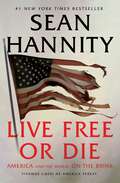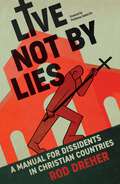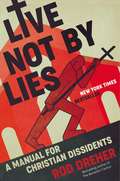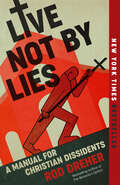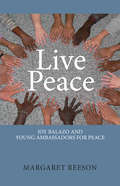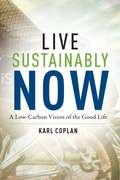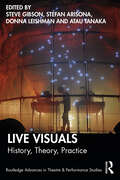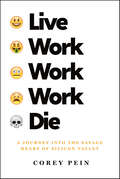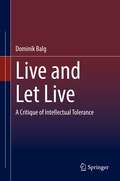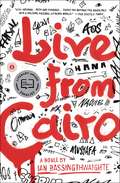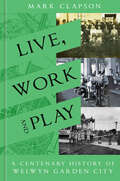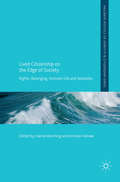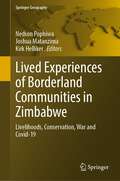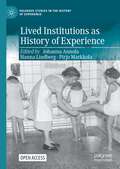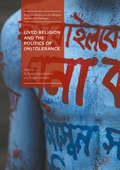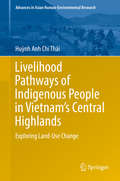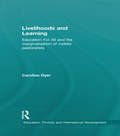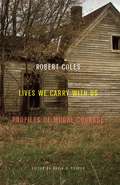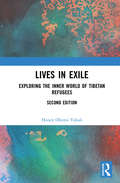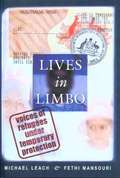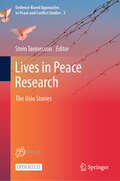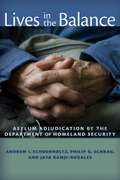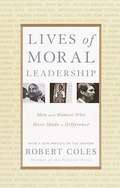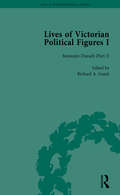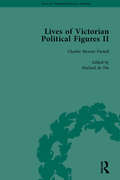- Table View
- List View
Live Free Or Die: America (and the World) on the Brink
by Sean Hannity#1 NEW YORK TIMES BESTSELLER America&’s top-rated cable news host offers his first book in over ten years: a look at America&’s fight against those who would reverse our tradition of freedom.America is great for a reason. Built on principles of freedom, rugged individualism, and self-sufficiency, no country has ever accumulated more power and wealth, abused it less, or used that power more to advance the human condition. And yet, as America blossomed, leftwing radicalism and resentment festered beneath the surface, threatening to undermine democracy in the form of social justice warriors, the deep state, and compromised institutions like academia and the mainstream media. With the Democratic victory in 2020, we are now at risk for a big step toward full-blown socialism along with the economic dysfunction and social strife that are its hallmarks. With radical Democrats demanding the Green New Deal, socialized medicine, abortion on demand, open borders, abolishing the Electoral College, packing the Supreme Court, and an end to free speech, our great nation will be fundamentally transformed beyond recognition. Ronald Reagan once said, &“Freedom is but one generation away from extinction,&” and his words have never rung truer. In Live Free or Die, Sean demonstrates why now is an All Hands on Deck moment to save the Republic.
Live Not By Lies (UK EDITION): A Manual For Dissidents in Christian Countries
by Rod DreherHave you ever felt implicit pressure to 'go along' with something you believe not to be true?Since Live Not by Lies was originally published in 2020 with a warning for America, many have seen in Europe and other Western nations an acceleration of 'soft totalitarianism' in our societies. Whether it is the effects of cancel culture online because of progressive voices marginalising conservative opinions, or the unprecedented restrictions of civil liberties in response to Covid-19, people feel coerced to go along with the approved narrative on whatever topic, even if, secretly, we may believe the truth is somewhat different.Rod Dreher believe this represents a creeping 'soft' totalitarianism, where 'safety' is seen as paramount and technology is increasingly employed in its pursuit. As we sleepwalk through the erosion of our freedoms, we hasten the possibility of a corporate surveillance state that restricts our ability to make decisions about our own lives. In Live Not By Lies, Dreher amplifies the alarm sounded by the brave men and women who fought totalitarianism in the former Soviet bloc and who see similarities today in the West. He draws on the experience of brave dissidents - some, like Aleksandr Solzhenitsyn, known worldwide, but many others whose quiet heroism is revealed here for the first time - who offer practical advice for how to identify this trend and resist it. Live Not By Lies aims to wake us and equip us for the long resistance.
Live Not By Lies: A Manual For Christian Dissidents
by Rod DreherThe New York Times bestselling author of The Benedict Option draws on the wisdom of Christian survivors of Soviet persecution to warn American Christians of approaching dangers. For years, émigrés from the former Soviet bloc have been telling Rod Dreher they see telltale signs of "soft" totalitarianism cropping up in America--something more Brave New World than Nineteen Eighty-Four. Identity politics are beginning to encroach on every aspect of life. Civil liberties are increasingly seen as a threat to "safety". Progressives marginalize conservative, traditional Christians, and other dissenters. Technology and consumerism hasten the possibility of a corporate surveillance state. And the pandemic, having put millions out of work, leaves our country especially vulnerable to demagogic manipulation. In Live Not By Lies, Dreher amplifies the alarm sounded by the brave men and women who fought totalitarianism. He explains how the totalitarianism facing us today is based less on overt violence and more on psychological manipulation. He tells the stories of modern-day dissidents--clergy, laity, martyrs, and confessors from the Soviet Union and the captive nations of Europe--who offer practical advice for how to identify and resist totalitarianism in our time. Following the model offered by a prophetic World War II-era pastor who prepared believers in his Eastern European to endure the coming of communism, Live Not By Lies teaches American Christians a method for resistance: * SEE: Acknowledge the reality of the situation. * JUDGE: Assess reality in the light of what we as Christians know to be true. * ACT: Take action to protect truth. Aleksandr Solzhenitsyn famously said that one of the biggest mistakes people make is assuming totalitarianism can't happen in their country. Many American Christians are making that mistake today, sleepwalking through the erosion of our freedoms. Live Not By Lies will wake them and equip them for the long resistance.
Live Not by Lies: A Manual for Christian Dissidents
by Rod DreherThe New York Times bestselling author of The Benedict Option draws on the wisdom of Christian survivors of Soviet persecution to warn American Christians of approaching dangers.For years, émigrés from the former Soviet bloc have been telling Rod Dreher they see telltale signs of "soft" totalitarianism cropping up in America--something more Brave New World than Nineteen Eighty-Four. Identity politics are beginning to encroach on every aspect of life. Civil liberties are increasingly seen as a threat to "safety". Progressives marginalize conservative, traditional Christians, and other dissenters. Technology and consumerism hasten the possibility of a corporate surveillance state. And the pandemic, having put millions out of work, leaves our country especially vulnerable to demagogic manipulation.In Live Not By Lies, Dreher amplifies the alarm sounded by the brave men and women who fought totalitarianism. He explains how the totalitarianism facing us today is based less on overt violence and more on psychological manipulation. He tells the stories of modern-day dissidents--clergy, laity, martyrs, and confessors from the Soviet Union and the captive nations of Europe--who offer practical advice for how to identify and resist totalitarianism in our time. Following the model offered by a prophetic World War II-era pastor who prepared believers in his Eastern European to endure the coming of communism, Live Not By Lies teaches American Christians a method for resistance: • SEE: Acknowledge the reality of the situation. • JUDGE: Assess reality in the light of what we as Christians know to be true. • ACT: Take action to protect truth.Aleksandr Solzhenitsyn famously said that one of the biggest mistakes people make is assuming totalitarianism can't happen in their country. Many American Christians are making that mistake today, sleepwalking through the erosion of our freedoms. Live Not By Lies will wake them and equip them for the long resistance.
Live Peace: Joy Balazo and Young Ambassadors for Peace
by Margaret Reeson'We can't change what happened. We can only change what happens next.'As an experienced worker for human rights in the Asia-Pacific region, Joy Balazo was troubled by the many examples of conflict she was observing. In 2001, while working for the Uniting Church of Australia, she devised a practical model of workshops and networks to sow 'seeds of peace' among young people living on opposite sides of conflict. This was named Young Ambassadors for Peace. Joy has used this model in many contexts, including Asian cities and Pacific islands, to help hundreds of people work for peace in their own broken communities.'Joy Balazo's work with Young Ambassadors for Peace has transformed and saved lives, and probably avoided wars. She has spent a lifetime building peaceful communities in areas damaged by generations of conflict. Margaret Reeson has captured Joy's life, passion and drive beautifully. The reader can visualise Joy's fiery determination and strength of faith. We also see a very human Joy, who has learnt to acknowledge mistakes, but never gives up. This book provides the peacemaker with key messages about respect, trust, faith and perseverance' (Jennifer Scott, Arbitrator and mediator).'Joy Balazo is one of my heroes - living her faith in practical yet potentially world-changing ways. Margaret Reeson tells her story compellingly, from Joy's traumatic experience during turmoil in the Philippines to her broad engagement in human rights in many countries.This is not just a 'ripping yarn', but a glimpse into living-memory history through the eyes of one petite person with a huge heart, dauntless determination and a fearless faith - it will keep you enthralled' (Jill Tabart, Former National President of the Uniting Church in Australia).
Live Sustainably Now: A Low-Carbon Vision of the Good Life
by Karl CoplanAny realistic response to climate change will require reducing carbon emissions to a sustainable level. Yet even people who already recognize that the climate is the most urgent issue facing the planet struggle to understand their individual responsibilities. Is it even possible to live with a sustainable carbon footprint in modern American society—much less to live well? What are the options for those who would like to make climate awareness part of their daily lives but don’t want to go off the grid or become a hermit?In Live Sustainably Now, Karl Coplan shares his personal journey of attempting to cut back on carbon without giving up the amenities of a suburban middle-class lifestyle. Coplan chronicles the joys and challenges of a year on a carbon budget—kayaking to work, hunting down electric-car charging stations, eating a Mediterranean-style diet, and enjoying plenty of travel on weekends and vacations while avoiding long-distance flights. He explains how to set a personal carbon cap and measure your actual footprint, with his own results detailed in monthly diary entries. Presenting the pros and cons of different energy, transportation, and lifestyle options, Live Sustainably Now shows that there does not have to be a trade-off between the ethical obligation to maintain a sustainable carbon footprint and the belief that life should be fulfilling and fun. This powerful and persuasive book provides an individual-level blueprint for a carbon-sustainable tweak to the American dream.
Live Visuals: History, Theory, Practice (Routledge Advances in Theatre & Performance Studies)
by Steve Gibson Stefan Arisona Donna Leishman Atau TanakaThis volume surveys the key histories, theories and practice of artists, musicians, filmmakers, designers, architects and technologists that have worked and continue to work with visual material in real time. Covering a wide historical period from Pythagoras’s mathematics of music and colour in ancient Greece, to Castel’s ocular harpsichord in the 18th century, to the visual music of the mid-20th century, to the liquid light shows of the 1960s and finally to the virtual reality and projection mapping of the present moment, Live Visuals is both an overarching history of real-time visuals and audio-visual art and a crucial source for understanding the various theories about audio-visual synchronization. With the inclusion of an overview of various forms of contemporary practice in Live Visuals culture – from VJing to immersive environments, architecture to design – Live Visuals also presents the key ideas of practitioners who work with the visual in a live context. This book will appeal to a wide range of scholars, students, artists, designers and enthusiasts. It will particularly interest VJs, DJs, electronic musicians, filmmakers, interaction designers and technologists.
Live Work Work Work Die: A Journey into the Savage Heart of Silicon Valley
by Corey PeinA scathing, sardonic exploration of Silicon Valley tech culture, laying bare the greed, hubris, and retrograde politics of an industry that aspires to radically transform society for its own benefitAt the height of the startup boom, journalist Corey Pein set out for Silicon Valley with little more than a smartphone and his wits. His goal: to learn how such an overhyped industry could possibly sustain itself as long as it has. But to truly understand the delirious reality of the tech entrepreneurs, he knew he would have to inhabit that perspective—he would have to become an entrepreneur himself. Thus Pein begins his journey—skulking through gimmicky tech conferences, pitching his over-the-top business ideas to investors, and rooming with a succession of naive upstart programmers whose entire lives are managed by their employers—who work endlessly and obediently, never thinking to question their place in the system.In showing us this frantic world, Pein challenges the positive, feel-good self-image that the tech tycoons have crafted—as nerdy and benevolent creators of wealth and opportunity—revealing their self-justifying views and their insidious visions for the future. Vivid and incisive, Live Work Work Work Die is a troubling portrait of a self-obsessed industry bent on imposing its disturbing visions on the rest of us.
Live and Let Live: A Critique of Intellectual Tolerance
by Dominik BalgTolerance - desired by many and often demanded: By UNESCO, by the Pope, by Angela Merkel and Barack Obama. But what exactly does it mean to be tolerant? Does tolerance imply rejection? Or is tolerance merely the opposite of dogmatism? And how does a tolerant attitude differ from an indifferent one? Dominik Balg, starting from a well-founded explication of the concept of tolerance, subjects a tolerant attitude as an intellectual attitude toward conflicting opinions to a detailed critique and discusses the plausibility of general tolerance claims in specific domains such as politics, religion, or ethics. He considers possible alternatives to a tolerant attitude and presents with intellectual open-mindedness and humility two substantial attitudes that can be clearly distinguished from a tolerant attitude and - in contrast to tolerance - can also be easily demanded on a general level. - With a foreword by Thomas Grundmann. This book is a translation of the original German 1st edition Leben und leben lassen by Dominik Balg, published by J.B. Metzler, an imprint of Springer-Verlag GmbH Germany, part of Springer Nature in 2020. The translation was done with the help of artificial intelligence (machine translation by the service DeepL.com). A subsequent human revision was done primarily in terms of content, so that the book will read stylistically differently from a conventional translation. Springer Nature works continuously to further the development of tools for the production of books and on the related technologies to support the authors.
Live from Cairo: A Novel
by Ian BassingthwaighteFrom a hugely talented, award-winning young author, a brilliant, lively debut novel about an impulsive American attorney, a methodical Egyptian translator, and a disillusioned Iraqi-American resettlement officer trying to protect a refugee who finds herself trapped in Cairo during the turbulent aftermath of the January 25 revolution.Cairo, 2011. President Mubarak has just been ousted from power. The oldest city in the world is reeling from political revolution, its consequent hopes and fears, its violence, triumphs, and defeats. But for the people actually living there, daily life has not slowed down but become wilder, more dangerous, and, occasionally, freeing. Live from Cairo is the exuberant, dazzling story of these people: Dalia, a strong-willed Iraqi refugee who finds herself trapped in Egypt after her petition to resettle in America with her husband is denied. Charlie, her foolhardy attorney, whose frustration with the legal bureaucracy and complicated feelings for Dalia have led him to forge a not entirely legal plan to get her out. Aos, Charlie’s fastidious translator and only friend, who spends his days trying to help people through the system and his nights in Tahrir Square protesting against it. And Hana, a young and disenchanted Iraqi-American resettlement officer; she is the worker assigned to Dalia’s case, deciding whether to treat her plight as merely one more piece of paperwork, or as a full-blooded human crisis. As these individuals come together, a plot is formed to help Dalia. But soon laws are broken, friendships and marriages are tested, and lives are risked—all in an effort to protect one person from the dangerous sweep of an unjust world. A vibrant portrait of a city in all its teeming chaos and glory, Live from Cairo is an exhilarating, electrifying debut, and a stunning testament to the unconquerable desire of people to rise above tragedy to seek love, friendship, humor, and joy.
Live, Work and Play: A Centenary History of Welwyn Garden City
by Mark ClapsonBooks about history using real life memories recorded specifically for the purpose are rare, Live, Work & Play is just such a book. Created from the hundreds of reminiscences of the residents of the town gathered by the WGC Heritage Trust and put into historical context by Prof Mark Clapson , one of the UK’s leading social historians, the book offers a unique insight into the creation of the UK’s second garden city. Timed to appear at the start of 2020, when Welwyn Garden City achieves its 100th year, the history of Sir Ebenezer Howard’s final masterpiece, with all its imperfections, is laid out for all to read. Now thriving and at ease with itself WGC is an example of how to create homes for its community. Created as a Garden City in 1920, developed as a New Town from 1948 the lessons it offers are invaluable to both developers and governments alike.
Lived Citizenship on the Edge of Society
by Hanne Warming Kristian FahnøeThis edited collection presents the concept of lived citizenship as a fruitful avenue for exploring the role played by social work practices in the lives of people in vulnerable positions. The book centres on the everyday experiences through which people practice, negotiate, understand and feel their citizenship. The authors offer both empirical analyses of how social work influences the rights, obligations, identities and belongings of children, homeless people, migrants, ethnic minorities, and young people with mental disabilities; and a theoretical framework for analysing the complexities of social work. Drawing on the notion of intimate citizenship and an understanding of citizenship as socio-spatial, the theoretical framework addresses the challenges of enhancing the agency of social work clients and of promoting inclusive citizenship, and how these challenges are shaped by emotions, affect, rationality, materiality, power relations, policies and managerial strategies. Lived Citizenship on the Edge of Society will be of interest to students and scholars across a range of disciplines including social policy and social work.
Lived Experiences of Borderland Communities in Zimbabwe: Livelihoods, Conservation, War and Covid-19 (Springer Geography)
by Kirk Helliker Joshua Matanzima Nedson PophiwaThis book examines the national borders and borderlands of Zimbabwe through the presentation of empirically rich case studies. It delves into the lived experiences, both past and present, of populations residing along the borders between Zimbabwe and its neighbours, i.e., Zambia, Botswana, South Africa and Mozambique. It locates these lived experiences within the political economy of Zimbabwe, and highlights a wide range of themes pertinent to borders, including health, COVID-19, marginalisation, resource access, conservation, human-wildlife conflicts, civil wars, politico-economic crises, border jumping and cross border trade. The borderland communities discussed also include ethnic minorities such as the Tonga, San, Ndau, Shangane, and Kalanga. Overall, the book demonstrates the centrality of borders to the Zimbabwean nation-state and the importance of reading history, politics and society from the borderlands.The book fits into the wider prevailing literature of border and borderlands in Africa and beyond and thus has appeal far beyond Zimbabwe. Its diverse themes also relate to topics covered in multiple disciplines, including history, anthropology, and sociology. Academics, development specialists and policy makers will benefit in different ways from the depth and breadth of the analysis in the book.
Lived Institutions as History of Experience (Palgrave Studies in the History of Experience)
by Johanna Annola Hanna Lindberg Pirjo MarkkolaThis open access book focuses on institutions that were produced and formed by the emerging welfare state. How were institutions experienced by the people who interacted with them? How did institutions as sites of experience shape and structure people’s everyday lives? Histories of institutions have mainly focused on the structures and power relations produced by institutional settings. Likewise, despite an extensive historiography of the welfare state, reflections on individuals’ experiences of welfare are few. By using ‘lived institutions’ as its conceptual frame, this edited collection merges the fields of institutional studies, the history of the welfare state – and the novel and vibrant field of the history of experience.
Lived Religion and the Politics of (In)Tolerance
by R. Ruard Ganzevoort Srdjan SremacThis volume explores the ways in which lived religion encourages and contributes to conflicts, as well as fosters tolerance, in the interlocking rural, urban, and virtual social spheres. Through ten case studies with vast geographical and religious variation, the contributors address some of the shortcomings in analyses of the relationship between religion and (in)tolerance and offers a theoretically and empirically more nuanced understanding of the micro-politics of (in)tolerance and the roles of lived religion in it. The book argues that (in)tolerance and its connection to religion cannot be fully understood unless analyzed from below, which means that the focus needs to be not only on public institutions or religio-political spaces but also on (in)tolerance of ordinary people and their performativity, practices, and interests in non-institutionalized spaces. This showcases the ambiguous interconnectedness of lived religion and (in)tolerance. Lived Religion and the Politics of (In)Tolerance will be of interest to students and scholars interested in lived religion, the relationship between politics and religion, and those working in cross-cultural dialogue and through an anti-racism, and anti-violence lens.
Livelihood Pathways of Indigenous People in Vietnam’s Central Highlands: Exploring Land-Use Change (Advances in Asian Human-Environmental Research)
by Huỳnh Anh Chi TháiThis study focuses on impacts of the environmental and socio-economic transformation on the indigenous people's livelihoods in Vietnam's Central Highlands recent decades since the country's reunification in 1975.The first empirical section sheds light on multiple external conditions (policy reforms, population trends, and market forces) exposed onto local people. The role of human and social capital is examined again in a specific livelihood of community-based tourism to testify the resilience level of local people when coping with constraints. The study concludes with an outlook on implications of development processed which still places agriculture at the primary position livelihood, and pays attention to human capital and social capital of indigenous groups in these highlands.
Livelihoods and Learning: Education For All and the marginalisation of mobile pastoralists (Education, Poverty and International Development)
by Caroline DyerCurrent paradigms of ‘development’ generally serve mobile pastoralist groups poorly: their visibility in policy processes is minimal, and their mobility is constructed by the powerful as a ‘problem’, rather than as a rational livelihood strategy. Increasingly damaged eco-systems, shrinking natural resources, globalisation and urbanisation all put pressure on pastoralist livelihoods. Such processes often worsen, rather than alleviate, poverty and socio-economic marginalisation among pastoralists, but they also precipitate engagement with forms of education that may improve their future livelihood security and social status, and enhance occupational diversification. Opening with a discussion of how the relationships between education, poverty and development have been conceived in dominant development discourses, this book reviews the disappointing international experience of education provision to mobile pastoralist groups. It highlights a lack of sufficient flexibility and relevance to changing livelihoods and, more fundamentally, education’s conceptual location within a sedentarist paradigm of development that is antagonistic to mobility as a legitimate livelihood strategy. These global themes are examined in India, where policy and practices of education inclusion for mobile, marginalised groups are critiqued. Empirically-based chapters drawing on ethnographic research, provide detailed insights into how the Rabaris of Kachchh – a pastoralist community in Gujarat, Western India – engage with education as a social and economic development strategy for both adults and children, and show how ethnographic and participatory research approaches can be used for policy advocacy for marginalised groups. Livelihoods and Learning highlights the complex, contested and often inconsistent role of education in development and the social construction of poverty, and calls for a critical reappraisal of the notion of ‘education’. The book will be key reading for postgraduates and academics in education, development studies, international and comparative education and research methodology, as well as policy-makers, ministries and related agencies with responsibility for education.
Lives We Carry with Us
by Robert Coles David C. CooperLives We Carry with Us gathers together for the first time a diverse cross section of Coles's profiles, originally published in our premier magazines over the span of five decades but never before collected in book form. Depicting the famous, the lesser known, and the unknown, the profiles here include portraits of James Agee, Dorothy Day, Erik Erikson, Dorothea Lange, Walker Percy, Bruce Springsteen, Simone Weil, and William Carlos Williams among others. Coles has chosen figures whom he considers his guardian spirits-individuals who shaped, challenged, and inspired one of the great moral voices of our era.Profiles include:James Rufus Agee (1909 - 1955) was was one of the most influential film critics in the U.S. He was the author of Let Us Now Praise Famous Men (to which he contributed the text and Walker Evans contributed the photographs) which grew out of an assignment the two men accepted in 1936 to produce a magazine article on the conditions among white sharecropper families in the American South. His autobiographical novel, A Death in the Family (1957), won the author a posthumous Pulitzer Prize. Simone Weil (1909 - 1943) was a French philosopher, activist, and religious searcher, whose death in 1943 was hastened by starvation. Weil published during her lifetime only a few poems and articles. With her posthumous works --16 volumes in all -- Weil has earned a reputation as one of the most original thinkers of her era. T.S. Eliot described her as "a woman of genius, of a kind of genius akin to that of the saints." William Carlos Williams (1883 - 1963), was an American poet who was also a pediatrician and general practitioner of medicine. Williams "worked harder at being a writer than he did at being a physician," wrote biographer Linda Wagner-Martin; but during his long lifetime, Williams excelled at both. He considered himself a socialist and opponent of capitalism and is probably spinning in his grave at the current state of things, economically and socially. One of his best known poems is an "apology poem" taught to most American children in elementary school called "This Is Just to Say" : "I have eaten / the plums / that were in / the icebox / and which / you were probably /saving / for breakfast. / Forgive me / they were delicious / so sweet /and so cold."Dorothy Day (1897 - 1980) was an American journalist and social activist who became most famous for founding, with Peter Maurin, the Catholic Worker movement, a nonviolent, pacifist movement which combines direct aid for the poor and homeless with nonviolent direct action on their behalf. Dorothea Lange (1895 - 1965) was a hugely influential American documentary photographer and photojournalist, best know for her Depression-era work for the Farm Security Administration (FSA). Lange's photographs humanized the tragic consequences of the Great Depression and profoundly influenced the development of documentary photography, one of Robert Coles' great passions.Erik Erikson (1902 - 1994) was a Danish-German-American developmental psychologist and psychoanalyst known for his theories on social development of human beings. He may be most famous for coining the phrase "identity crisis." Erikson's greatest innovation was to postulate not five stages of development, as Freud has done with his psychosexual stages, but eight. Erik Erikson believed that every human being goes through a certain number of stages to reach his or her full development, theorizing eight stages, that a human being goes through from birth to death.Walker Percy (1916 - 1990) was an American southern author best known for his philosophical novels set in and around New Orleans, the first of which, The Moviegoer, won the National Book Award for Fiction in 1962. He devoted his literary life to the exploration of "the dislocation of man in the modern age." His work displays a unique combination of existential questioning, Southern sensibility, and deep Catholic faith -- all themes of great interest to Coles.Bruce Frederick Joseph Springsteen (born September 23, 1949), has long been in Rob...
Lives in Exile: Exploring the Inner World of Tibetan Refugees
by Honey Oberoi VahaliThis book explores the devastating consequences and psychological ruptures of refugeehood as it evocatively recounts the life histories of dislocated Tibetans expelled from their homes since 1959. Following the genre of a story, the book offers dynamic understandings of unconscious processes and the intergenerational transmission of trauma across generations of an exiled and internally displaced people. The book analyses the paradoxical spaces which Tibetans in exile occupy as they strive to preserve their cultural and spiritual heritage, rituals, religion, and language while also dynamically remoulding themselves to adapt to their living realities. Presenting a nuanced picture, it narrates stories of refugees, political prisoners and survivors of torture along with stories of loss and angst, cultural celebrations and political demonstrations. The author in this new edition highlights and explores the art, artists, and poetry in the exiled community. The volume also looks at the significance of Buddhism and the philosophy of the Dalai Lama for the people in exile and the personal and collective will of the community to connect their lost past to a living present and an imagined future. Rooted in the psychoanalytical tradition, this book will be of interest to psychologists, sociologists, political scientists, scholars of literature, and arts and aesthetics. It will also appeal to those interested in Sino-Tibetan relations, Buddhist studies, South Asian Studies, cultural and peace studies, and those working with refugees, and displaced persons.
Lives in Limbo: Voices of Refugees Under Temporary Protection
by Michael Leach Fethi MansouriIn this book, 35 refugees, all temporary protection visa (TPV) holders and mostly from Iraq and Afghanistan, talk directly about their quest for asylum in Australia. They provide poignant details of persecution in their home country, their journey to Australia, prolonged periods of mandatory detention, and life under Australia's controversial temporary protection regime.
Lives in Peace Research: The Oslo Stories (Evidence-Based Approaches to Peace and Conflict Studies #3)
by Stein TønnessonThis open access book explains how PRIO, the world’s oldest peace research institute, was founded and how it survived through crises. In this book, twenty-four of its researchers and associates, including Johan Galtung, Ingrid Eide, and Mari Holmboe Ruge, who founded the institute back in 1959, tell the stories of their roles in inventing and developing peace research. They reflect on their personal experiences with peace and conflict, tell what drove their peace engagement, and discuss the balance sought in the field between the cold dictates from academic rigor and the hot pursuit of peace, a desire for research to make a positive difference. Most of the chapters are interviews where one colleague interviews another. Some are self-reflective essays, while others are memorial essays written about a peace researcher who has passed away. Taken together, the book presents a lively picture of a thriving world-leading research environment and a wealth of conflicting or mutually reinforcing perspectives on war, violence, conflict, conflict management and resolution, negotiations and mediation, peacemaking, peace building, and the contested concept of peace.“The Oslo Stories is an indispensable source to the history of peace research.”Dr. Olav Njølstad, Director, Nobel Institute, Oslo
Lives in the Balance: Asylum Adjudication by the Department of Homeland Security
by Philip G. Schrag Andrew I. Schoenholtz Jaya Ramji-NogalesAlthough Americans generally think that the U.S. Department of Homeland Security is focused only on preventing terrorism, one office within that agency has a humanitarian mission. Its Asylum Office adjudicates applications from people fleeing persecution in their homelands. Lives in the Balance is a careful empirical analysis of how Homeland Security decided these asylum cases over a recent fourteen-year period.Day in and day out, asylum officers make decisions with life-or-death consequences: determining which applicants are telling the truth and are at risk of persecution in their home countries, and which are ineligible for refugee status in America. In Lives in the Balance, the authors analyze a database of 383,000 cases provided to them by the government in order to better understand the effect on grant rates of a host of factors unrelated to the merits of asylum claims, including the one-year filing deadline, whether applicants entered the United States with a visa, whether applicants had dependents, whether they were represented, how many asylum cases their adjudicator had previously decided, and whether or not their adjudicator was a lawyer. The authors also examine the degree to which decisions were consistent among the eight regional asylum offices and within each of those offices. The authors’ recommendations, including repeal of the one-year deadline, would improve the adjudication process by reducing the impact of non-merits factors on asylum decisions. If adopted by the government, these proposals would improve the accuracy of outcomes for those whose lives hang in the balance.
Lives of Moral Leadership
by Robert ColesIn this rich and illuminating book, the Pulitzer Prize-winning, bestselling author Robert Coles creates a portrait of moral leadership--what it is, and how it is achieved--through stories of people who have led and inspired him: Robert Kennedy, Dorothy Day, Dietrich Bonhoeffer, Erik Erikson, a Boston bus driver, teachers in college, medical school, and elementary school, among others.Coles tells how to be a moral leader and shows how the intervention of one person can change the course of history, as well as influence the day-to-day quality of life in our homes, schools, communities, and nation. We need to "hand one another along" in life, says Coles, quoting his friend Walker Percy, and in Lives of Moral Leadership he explores how each of us can be engaged in a continual and mutual life-giving process of personal and national leadership development. Coles discusses how the actions of the American president affect the way people feel about themselves and the country, and-citing the influence of Shakespeare's Henry V on Robert Kennedy, and of Tolstoy's Anna Karenina on his own mother--explains how reading literature can motivate action and growth. The way in which moral leaders emerge today, and for all time, comes vividly to light in this brilliant book by one of America's finest teachers and writers.From the Hardcover edition.
Lives of Victorian Political Figures, Part I, Volume 2: Palmerston, Disraeli and Gladstone by their Contemporaries
by Michael Partridge Richard Gaunt Nancy LoPatin-LummisAims to bring alive, through the eyes of their contemporaries, three of the greatest political figures of the Victorian era - Henry, third Viscount Palmerston, Benjamin Disraeli and William Gladstone. This four-volume set draws together various documents including journals and diaries, pamphlets, correspondence, and other ephemeral literature. Volume 2 covers the political life of Benjamin Disraeli (Part I).
Lives of Victorian Political Figures, Part II, Volume 2: Daniel O'Connell, James Bronterre O'Brien, Charles Stewart Parnell and Michael Davitt by their Contemporaries
by Michael Partridge Nancy LoPatin-LummisLooks at the lives and politics of four of the key players in the independence and labour movements of the 19th century: Daniel O'Connell (1775-1847); Charles Stewart Parnell (1846-91); Michael Davitt (1846-1906); and James Bronterre O'Brien (1805-64). Volume 2 looks at the life of Charles Stewart Parnell.
